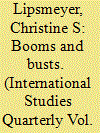| Srl | Item |
| 1 |
ID:
109576


|
|
|
|
|
| Publication |
2011.
|
| Summary/Abstract |
A crowded field of research has focused on the relationship between government ideology and welfare policy. In advancing this work, I refocus the debate on how the economic context can affect the manner in which governments shape welfare spending. In my analyses of social expenditures during times of economic booms and busts, I find that governments in recessions relax their ideological visions, while those in periods of prosperity have the room to make discretionary policy changes. By combining theories of government behavior with assumptions about preferences during diverse economic climates, these findings show how the economic environment affects governments' abilities to implement ideological policies. More importantly, this transcends the extant literature, resulting in a more complete picture of the relationship between politics and welfare policies.
|
|
|
|
|
|
|
|
|
|
|
|
|
|
|
|
| 2 |
ID:
162768


|
|
|
|
|
| Summary/Abstract |
How do domestic politics in the donor country affect foreign aid policy? Scholars have analyzed the impact that political parties and domestic institutions play in shaping aid effort. Building on this previous work, we examine the impact of domestic politics on the channels chosen for aid distribution. In this paper, we explore whether and how the ideological composition of donor governments affects the method of delivering aid to recipient states. Specifically, we argue that more liberal governments are more inclined to provide aid via nongovernmental organizations (NGOs), while more conservative governments prefer to give aid through direct bilateral government-to-government channels. These choices, we argue, reflect the different goals that right and left parties pursue through their allocation of foreign aid. Our results indicate that left governments are more inclined to channel aid through NGOs in an attempt to directly implement poverty alleviation strategies. Alternatively, right wing governments place a greater emphasis on channeling aid through recipient state governments to promote the economic interests of their constituents and the geopolitical interests of the state.
|
|
|
|
|
|
|
|
|
|
|
|
|
|
|
|
| 3 |
ID:
172771


|
|
|
|
|
| Summary/Abstract |
In many European countries established leftwing and rightwing parties have been threatened by policy convergence and, in turn, new populist parties that offer more polarized platforms. I investigate whether government ideology influences dragnet-controls – controls of persons conducted by the police without having any suspicion that the controlled person committed a crime. They took effect after the Schengen Agreement in 1995. I propose dragnet-controls to be a prime example of ideology-induced policies implemented by established parties. Dragnet-controls confine citizens’ liberties, but may help to detect criminals. Using data from the 16 German states over the period 1995–2017, I show that rightwing governments have been active in implementing dragnet-controls and leftwing governments have denied dragnet-controls since the mid 1990s. When evaluating how government/party ideology influences individual policies, previous econometric studies ignored initiatives in parliament. My study also considers initiatives in parliament. I conjecture that, since 2015, the rightwing CDU has used initiatives to introduce/extend dragnet-controls to also deal with the upcoming threat of rightwing populism. Future research should examine policy-differences between the established parties regarding more fine-grained policy measures also in other European countries.
|
|
|
|
|
|
|
|
|
|
|
|
|
|
|
|
| 4 |
ID:
121121


|
|
|
|
|
| Publication |
2013.
|
| Summary/Abstract |
This article focuses on the link between the representation of lesbian, gay, bisexual, and transgender (LGBT) people in national legislatures and the existence of equality laws focused on sexual orientation. It addresses three interrelated questions: how many "out" LGBT legislators have served in national parliaments, what explains the cross-national variation in their legislative presence, and what is the relationship between the presence of gay legislators and the enactment of laws that treat gay and straight citizens equally? There is an established literature arguing that the representation of women and ethnic minorities "descriptively" in national legislatures improves the realization of their policy preferences and the position of the group within the society as a whole. This article draws on that literature and extends the analysis to LGBT communities. It finds that the presence of even a small number of openly gay legislators is associated significantly with the future passage of enhanced gay rights, even after including controls for social values, democracy, government ideology, and electoral system design. Once openly gay legislators are in office they have a transformative effect on the views and voting behavior of their straight colleagues. This "familiarity through presence" effect is echoed in studies of U.S. state legislatures and levels of social tolerance of homosexuality in the population at large.
|
|
|
|
|
|
|
|
|
|
|
|
|
|
|
|